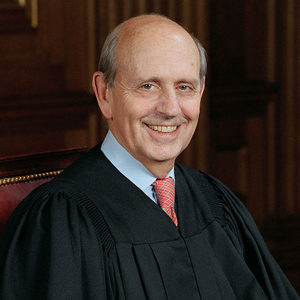Breyer was 'quintessential Enlightenment man in an increasingly unenlightened era,' op-ed says

U.S. Supreme Court Justice Stephen G. Breyer.
Early in his career, U.S. Supreme Court Justice Stephen G. Breyer clerked for Justice Arthur Goldberg, when the Supreme Court was recognizing racial equality and the rights of criminal suspects.
But as a justice, Breyer had the misfortune about halfway into his 28-year tenure “to be the quintessential Enlightenment man in an increasingly unenlightened era at the court,” according to former Supreme Court journalist Linda Greenhouse in an op-ed for the New York Times.
“Justice Breyer’s belief in the power of facts, evidence and expertise was out of step in a postfactual age,” Greenhouse wrote.
He was on the losing side in cases finding that protections of the Voting Rights Act were no longer needed in the South, that the Constitution protected an individual right to own a gun, and that the federal government could not require vaccines in larger workplaces.
Breyer has been described as a pragmatist and a person willing to compromise, which isn’t wrong, Greenhouse said. But the descriptions “discount the passion beneath the man’s cool and urbane persona, passion that I think stems from his early encounter with a court that understood the Constitution as an engine of progress.”
Greenhouse also said calls for Breyer to retire “became so vociferous, so belittling.”
“That is a loss not only for him—and he certainly deserves better—but also for the rest of us, because his career has much to teach us about the state of the court today,” Greenhouse said.
See also:
ABAJournal.com: “These 2 judges are considered front-runners to replace Breyer; who else is getting mentioned?”
Write a letter to the editor, share a story tip or update, or report an error.


